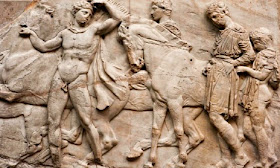Not even a week ago, I reported what was then the latest news on the
Parthenon Marbles: a new campaign for the reunification of the Parthenon Marbles has been launched
by UNESCO Goodwill Ambassador Marianna V. Vardinoyiannis. The campaign, titled
“Return (the Marbles), Restore (Parthenon), Restart (History), is based on an
initiative by the Elpida Association and the Melina Mercouri Foundation. It is
aimed at increasing awareness for the return of the Parthenon
Marbles. There is more news now, though: the Archaeology News Network
reports that some of the British Museum's Parthenon marbles will be included in an exhibition on the human body in Hellenic sculpture--which will inevitably stir up feelings on the most famous and bitterly contested Greek sculptures in the world, because it's quite possible the British Museum will be seeking sculptures from the Parthenon temple that Greece still holds or any other loans from Greece.
 |
| Some of the Parthenon sculptures held by the British Museum |
Relations between the British and the Greeks have not improved in the five years since the Greek government opened a new museum on the slopes of the Acropolis, pointedly displaying copies of the missing marbles, and the controversy was
stirred up again this year when the US actor George Clooney, promoting his new film about looted art, The Monuments Men, said it would be "very nice" if Bloomsbury gave the marbles back to Athens. The repeated response of the trustees of the British Museum has been that the marbles form an inalienable part of the collection, where they are available free to visitors all over the world.
That the Parthenon Marbles are an 'inalienable' part of the collection clearly shows in the visitor numbers of the British Museum; the museum announced in its annual review that it has had another record-breaking year, with visitor numbers up in 2013 by 20% to 6.7 million, making it the leading UK attraction and the second most visited museum in the world. In addition it had more than 20 million visitors to its website. The museum also tops the list of the world's lending collections. While these numbers wouldn't be guaranteed in Greece, should the marbles be returned, it must leave a sour taste in the mouths of Greek government officials to hear these numbers, and it once more drives home the stakes.
The Parthenon Marbles represent not only a historic investment for Britain, but also a huge potential loss of revenue should they be returned--and seeing as money makes the world go 'round, returning the marbles must be very low on Great Britain's to-do list. Requesting artwork from Greece, however, or even putting more attention on the pieces they already own feels a little like poking the bear.
It's very possible all of this will blow over and nothing will happen, but even if it does, the situation surrounding the Parthenon Marbles seems to be accelerating, and I have no idea in which direction it is heading. All I know is that should I ever visit Great Britain, I'll think twice about visiting the British Museum.

As you note, unlike the Acropolis Museum, the British Museum doesn't charge an admission fee (except to special exhibitions such as the one proposed), so I'm not quite sure how you can argue that the retention of the marbles would avoid a huge loss in revenue for the British Museum. Fewer visitors come… and not a lot happens.
ReplyDeleteIt's not like the Elgin Marbles are the only thing in the British Museum either - it's got everything from the Rosetta Stone through the Sutton Hoo helmet though to an Easter Island Moai. Even without the Elgin Marbles, which are well mocked up in the Acropolis Museum, it's still the best historical museum in the world (and I've been to more than a few) and people would come no matter what.
Equally, I'd be surprised if having the Elgin Marbles would encourage any more people to visit the Acropolis Museum than already go there. If you go to Athens and you go to the Acropolis, then you almost certainly go to the Museum as well, and I don't see that having the Marbles would change that.
So, ultimately, this is more about who has the Marbles more than money, which is for once actually quite irrelevant to the motivations of those involved, I would guess.